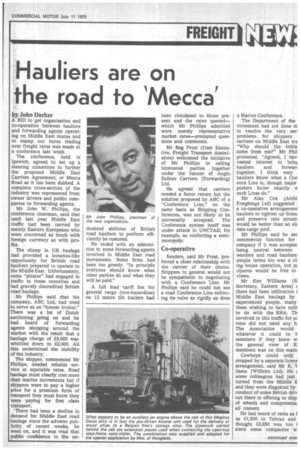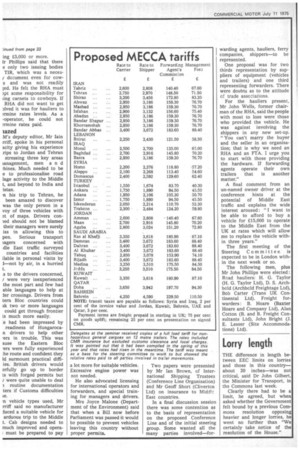Hauliers are on the road to 'Mecca'
Page 35

Page 36

If you've noticed an error in this article please click here to report it so we can fix it.
by John Darker
A BID to get organisation and co-operation between hauliers and forwarding agents operating on Middle East routes and to stamp out horse trading over freight rates was made at a conference last week.
The conference, held in Ipswich, agreed to set up a steering committee to further the proposed Middle East Carriers Agreement, or Mecca Road as it has been dubbed. A complete cross-section of the industry was represented from owner drivers and public companies to forwarding agents.
Mr John W. Phillips, the conference chairman, said that until last year Middle East traffic had been carried by mainly Eastern Europeans who were concerned as much with foreign currency as with profits.
The slump in UK haulage had provided a bonanza-like opportunity for British road hauliers prepared to operate to the Middle East. Unfortunately, some "pirates" had engaged in traffic to these countries and had gravely discredited British road haulage.
Mr Phillips said that his company, ABC Ltd, had tried to serve as an "honest broker." There was a lot of Dutch auctioning going on and he had beard of forwarding agents shopping around the market with the result that a haulage charge of £3,000 was whittled down to £2,000. All this undermined the stability of the industry.
• The 'shipper, commented Mr Phillips, needed reliable 'service at equitable rates. Road haulage must clearly cost more than marine movements but if shippers were to pay a higher price for a premium form of transport they must know they were paying for first class transport.
There had been a decline in demand for Middle East road haulage since the adverse publicity of recent weeks, he went on, and it was vital that public confidence in the un doubted abilities of British road hauliers to perform efficiently be restored.
He ended with an admonition to some forwarding agents involved in Middle East road movements. Some firms had been too greedy. "In principle everyone should know what other parties do and what they will be paid."
A full load tariff list for general cargo (non-hazardous) on 12 metre tilt trailers had been circulated to those present and the rates quoted— which Mr Phillips admitted were merely representative market rates—prompted questions and comments.
Mr Reg Frost (User Executive, Freight Transport Association) welcomed the initiative of Mr Phillips in calling interested parties together under the banner of Anglo Balkan Carriers (Forwarding) Ltd.
He agreed that carriers needed a fairer return but the solution proposed by ABC of a "Conference Line," on the same basis as Shipping Conferences, was not likely to be universally accepted. The Conference system itself was under attack in UNCTAD, for example, as conferring a semimonopoly.
Co-operative
Senders, •said Mr Frost, 'preferred a close relationship with the carrier of their choice. Shippers in general would not be sympathetic to negotiating with a Conference •Line. Mr Phillips said he could not see a road Conference Line enforcing its rules as rigidly as does a Marine Conference.
The Department of the vironment had not done m to resolve the very seri problems for shippers carriers on Middle East tra "Why should the initia come from me?" Mr Phil protested. "Agreed, I hay vested interest in brini hauliers and forwarc together. I think, very hauliers know what a Con ence Line is, though major porters know exactly NA such Lines do."
Mr Alan Cox (Archl Freightage Ltd) suggested a co-operative arrangement hauliers to tighten up licen; and preserve rate struoti would be better than an eh rate cargo pool.
Mr Phillips said he saA commercial function for company if it was acceptec being neutral between warders and road hauliers simple terms his was a ing house operation, but pE cipants would be free to views.
Mr Ken Williams (R Secretary, Eastern Area) there had been infiltration i Middle East haulage by experienced people, many them wishing to have noth to do with the RHA. Th involved in this traffic for sc time did not need any h The Association would whatever it could to 1'. members if they knew w the general view of R members was on this matt Cowboys could only stopped by a separate licens arrangement, said Mr R. 'V hams (Willhire Ltd). He some colleagues had just turned from the Middle E and they were disgusted by conduct of some British driv out there in offering to disp of wheels and components all corners.
He had heard of rates as I as £1,500 to Tehran and thought £2,650 was too I since some companies w ing £5,000 or more.
Er Phillips said that there e only two issuing bodies TIR, which was a neces r document even for cow s and was not readily ;ed. He felt the RHA must apt some responsibility for ling carnets to cowboys. If RHA did not want to get Dilved it was for hauliers to Trnine rates levels. As a -operator, he could not rntine rates paid.
lazed M's deputy editor, Mr lain rriff, spoke in his personal lefty giving his experience rips to Jordan and Tehran stressing three key areas ianagernent, men a n d :hines. Much needed to be e to professionalise road lage activity to the Middle t, and beyond to India and istan.
n his trip to Tehran, he been amazed to discover was the only person in a voy of three vehicles with at of maps. Drivers canted should not be blamed their managers were surely iss in allowing this to pen. Serious transport lagers concerned with die East traffic surveyed countries and facilities Liable in personal visits by i-not by air, in a hurried t.
.s to the drivers concerned, T were very inexperienced the most part and few had able languages to help at ler crossings. Drivers from tern Bloc countries could Alt two or more languages could get through frontier Ls much more easily.
:e had been impressed by readiness of Hungaroca n drivers to help other .ers in trouble. This was use the Eastern Bloc 'ers were fully experienced the route and confident they Ed surmount practical diffiies. British drivers would erfully go up to border ts with forged permits but were quite unable to deal routine documentation ters if Customs difficulties
e.
ri vehicle types used, Mr rriff said no manufacturer duced a suitable vehicle for arduous trip to the Middle t. Cab designs needed to much improved and opera, must be prepared to pay a lot more for suitable vehicles, Excessive engine power was not needed.
He also advocated licensing for international operators and forwarders, and special training for managers and drivers.
Mrs Joyce Malone (Department of the Environment) said that when a Bill now before Parliament was passed it would be possible to prevent vehicles leaving this country without proper permits. Two papers were presented by Mr Ian Brown, of International Shipping Trustees (Conference Line Organisation) and Mr Geoff Short (Cliverton Ltd) on insurance to Middlc East countries.
In a final discussion session there was some contention as to the basis of representation on the proposed Conference Line and of the initial steering group. Some wanted all the many parties involved-for warding agents, hauliers, ferry companies, shippers-to be represented.
One proposal was for two thirds representation by suppliers of equipment (vehicles and trailers) and one third representing forwarders. There were doubts as to the attitude of trade associations.
For the hauliers present, Mr John Wells, former chairman of the RHA, said the people with most to lose were those who provided the vehicle. He was against involving the shippers •in any new set-up.
"You can't marry the buyer and the seller in an organisa tion; that is why we need an RHA and an F'TA. I urge you to start with those providing the hardware. If forwarding agents operate their own trailers that is another matter."
A final comment from an un-named owner driver at the conference hints at the potential of Middle East traffic and explains the wide interest aroused: "I want to be able to afford to buy a vehicle for £15,000 to operate to the Middle East from the UK at rates which will allow me to replace the vehicle within three years."
The first meeting of the Steering Committee is expected to be in London within the next week or so.
The following men, plus Mr John Phillips were elected: Road hauliers: H. G. Taylor (ft G. Taylor Ltd), D. S. Archbold (Archbold Freightage Ltd), Bob Carter (Trans UK Continental Ltd). Freight forwarders: B. Hoare (Baxter Hoare and Company Ltd), Alan Cotton (B. and B. Freight Con sultants Ltd), John Bright (J. E. Lesser (Site Accommodations) Ltd).












































































































































